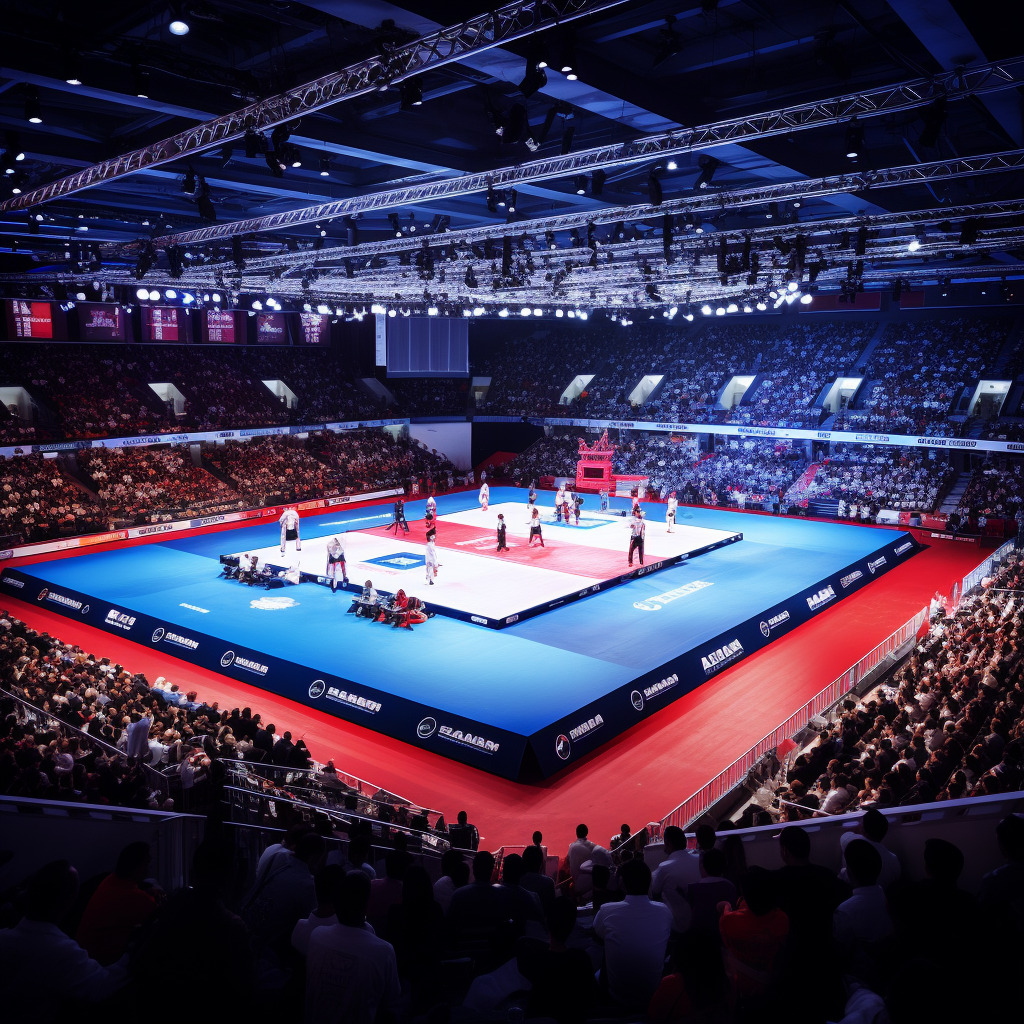Wo treten eigentlich die bekanntesten Karateka auf? Natürlich auf den renommierten Karate Turnieren. Bei den internationalen Wettkämpfen wird die Rangliste in den unterschiedlichen Alters- und Gewichtsklassen neu gemischt. Wir stellen euch vor, welche großen Wettkämpfe gehalten werden und bieten einen Überblick zu den Karate Wettkampfregeln.

Großen Meisterschaften beim Karate
Beim Karate gibt es keine Tabelle, wie beispielsweise im Judo die Judo Bundesliga. Die Karatekas treten in Landesverbänden gegeneinander an und küren die Besten bei den deutschen Mannschaftsmeisterschaften. International gibt es ebenfalls große Turniere, mehr dazu im Folgenden.
- Erstmals 1970 wurde in Tokio der Karate Weltmeister ermittelt, seitdem werden im Zweijahrestakt die Weltmeisterschaften ausgetragen. Verantwortlich für die Organisation ist die WKF (World Karate Federation), welche über 180 Mitgliedstaaten zählt. Unangefochtener Anführer der ewigen Tabelle ist Japan mit über 30 Goldmedaillen Vorsprung zum zweiten Platz namens Frankreich.
- Die Karate Europameisterschaften werden seit 1966 jährlich ausgetragen und stellen für deutsche Vereine die zweithöchste Herausforderung nach der Weltmeisterschaft dar, was den internationalen Karate Wettkampf angeht. Der Rekordhalter bei der EM ist Frankreich, wobei der Vorsprung der Franzosen nicht so groß ist, wie der Japans bei der WM.
- Noch ist Karate auch nicht bei den Olympischen Spielen vertreten. Bislang hatten sich Vertreter der Sportart dreimal vergeblich um eine Aufnahme bemüht. Es gibt eine Reihe von Abstimmungen, die erreichen wollen, dass Karate aufgenommen wird.
Nationalen Karate Meisterschaften
Die Karate Bundesliga wurde in der Zeit von 1991 bis 2002 als höchste nationale Liga angesehen, existiert seit 2002 allerdings nicht mehr. Seitdem ist das System so verändert worden, dass sich die ersten Mannschaften der Landesverbände für die deutschen Mannschaftsmeisterschaften qualifizieren.
- Die vom DKV (deutschen Karate Verband) ausgerichteten deutschen Mannschaftsmeisterschaften finden jährlich statt und werden nach Altersklassen aufgeteilt. Weiterhin wird eine separate Meisterschaft für Menschen mit Behinderung ausgetragen.
- Diverse weitere Turniere finden quer durch das Land verteilt statt, welche dann beispielsweise von den Landesverbänden ausgerichtet werden. Seht in dem für Eure Region zuständigen Verband nach (in Bayern zum Beispiel der Bayrische Karate Bund e.V.), um die nächsten Wettkampftermine herauszufinden.
Klassen beim Wettkampf
Die Karate Regeln des DKB schreiben eine Einteilung in Altersklassen vor, welche wie folgt aussehen:
- Kinder B U8
- Kinder A U10
- Schüler B U12
- Schüler A U14
- Jugend U16
- Junioren U18
- U21 U21
- Leistungsklasse Ab 18
- Masterklasse Ü30
- Masterklasse Ü40
- Masterklasse Ü50
- Masterklasse Ü60
In jeder dieser Altersklassen gibt es zusätzlich 2 bis 5 Gewichtsklassen, welche allerdings nur für die Disziplin Kumite gelten. Dort werden wiederum einzelne Ranglisten vergeben. Weiterhin existieren die Masterklassen Ü50 und Ü60 im Kumite nur für die Männer, die Karate-Frauen können in diesen Altersklassen nur in der Disziplin Kata antreten. In der Disziplin Kata gibt es keine Karate Gewichtsklassen, da hier mangels Gegner keine körperlichen Unterschiede auszugleichen sind.
Die Alters- und Gewichtsklassen im Karate werden jedes Jahr in Form einer PDF Datei vom deutschen Karateverband veröffentlicht: Zum Karateverband
Welche Regeln gelten für den Wettkampf?
In der Disziplin Kumite ist Euer Ziel, den Gegner durch Punktsieg zu schlagen. Punkte werden für Treffer vergeben, welche zwar kraftvoll ausgeführt sind, aber vor dem Körper des Gegners abgestoppt werden, um Schäden zu vermeiden.
Karate Kumite Regeln besagen: Fußtechniken an Kopf und Hals sowie Techniken am niedergefallenen Gegner bringen 3 Punkte, Fußtechniken auf Brust und Bauch 2 Punkte und alle anderen Hand- und Armtechniken 1 Punkt.
Für die Disziplin Kata ist das Regelwerk deutlich kleiner, da hier der Schutz des Kampfgegners nicht mit bedacht werden muss. Zur Wertung kommt lediglich die Ausführung der Techniken in den Punkten Kraft, Schnelligkeit, Präzision und Timing.
Für alle Karate Wettkämpfe gilt eine Kleiderordnung, deren Feinheiten der jeweiligen Prüfungsordnung zu entnehmen sind. Informiert Euch vor dem Wettkampf bei dem zuständigen Verband, welche detaillierten Regeln für Euren Wettkampf gelten, um eine Disqualifikation wegen derartiger Oberflächlichkeiten zu vermeiden.
Die erste Regel des Funakoshi lautet: „Karate beginnt und endet mit Respekt“ und sollte von Euch wirklich beherzigt werden. Das bedeutet, dass jegliche Streitereien, Provokationen sowie Beleidigungen auf und neben der Matte nichts zu suchen haben und sehr schnell zum Ausschluss vom Turnier führen können. Die Kampfrichter sind hier unnachgiebig. Wie immer gilt selbstverständlich, dass der Hauptkampfrichter das letzte Wort hat und seinen Anweisungen mit sofortiger Wirkung zu folgen ist.
- Boxsack Basics: Findet den perfekten Boxsack für euer Heimtraining - 23. November 2023
- Mobbing am Arbeitsplatz: Tipps & Hilfestellungen für Betroffene - 15. November 2023
- Wohnung & Haus effektiv vor Einbruch schützen: 10 Tipps & FAQ - 3. November 2023
